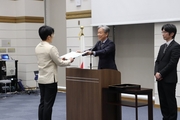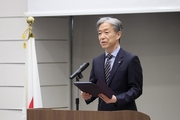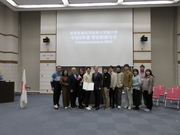イベント報告 2025/01/07
12月23日(月曜日)、学際融合領域研究棟2号館1階研修ホールにおいて学位記授与式を挙行しました。
授与式では、塩﨑一裕学長から修了生に学位記が手渡され、門出を祝して英語で式辞が述べられました。
当日は式典終了後の会場を記念撮影のために開放し、修了生、ご家族及び友人は和やかな雰囲気のもと歓談し、喜びを分かち合いました。
※ 今回の修了生の内訳は、以下のとおりです。
【博士後期課程修了者】
先端科学技術研究科 1名〈うち留学生 1名〉
計 1名(うち留学生1名)
【Congratulatory Remarks to Graduating Students】
President's Commencement Address (December, 2024)
It is a great honor for me to be the first to formally call you Dr. Ferrer. My heartfelt congratulations go to the newly minted PhD here and to his family, who have joined us to celebrate the significant milestone in his life. We greatly appreciate your presence today. Thank you very much.
About thirty-some years ago, I was also a graduate student who fought my way to a PhD. So, I know getting a PhD is challenging, and two PhDs must be even harder. You have been striving with your eyes kept on your goal, one PhD from Paris-Saclay University and yet another from NAIST. We salute what you have overcome and accomplished. Of course, we must not forget Professor Kawai's support here.
As you may have realized, you are the only one who has received your diploma today, and my commencement address is only for you. So, I decided to make it a little personal.
I was born in Wakayama, a seaside town about 70 km from here. My family had little connection to academia; indeed, I was a "first-generation student," meaning I was the first in my family to go to college. My parents probably didn't expect me to go even beyond college and attend graduate school for a PhD. Choosing my major also didn't go as planned. In my sophomore year, I accidentally peeked into a biology lecture where a professor explained how stimuli are transmitted along a nerve cell. The mechanism was fascinating enough for me to switch my major from physics to biology. Indeed, looking back on my career path, I realize a number of chance events affected my decisions at the crossroads of my life.
After completing my PhD, I moved to San Diego, California, to do a postdoc in the laboratory of Prof. Paul Russell, an eminent cell biologist, because he happened to be a good friend of my PhD supervisor. Four years later, I applied for assistant professor positions at more than 30 different institutions in the US, and I could have ended up at any one of them. After all, I received a job offer from University of California, Davis, where I was fortunate to work with excellent colleagues for more than 10 years.
In my decision to return to Japan and join NAIST as a faculty member, happenstances again played an important role. I don't have time to explain those happenstances today, but many people asked why I left UC Davis and if I missed the place. Alexander Graham Bell, known for his invention of the first practical telephone, said, "When one door closes, another opens; but we often look so long and so regretfully upon the closed door that we do not see the one which has opened for us." Indeed, coming to NAIST opened yet another door for me, which was an unexpected career opportunity as a university president.
According to one survey-based study, two-thirds of people believe that chance events have significantly influenced their careers, and obviously, I am one of them. Such chance events or happenstances are sometimes called "縁" in Japanese, a word derived from Buddhism. Considering the role of chance opportunities in driving our career, making definite long-term plans or commitments may not be very sensible, particularly when the future is uncertain in the era of VUCA: Volatility, Uncertainty, Complexity, and Ambiguity.
But don't get me wrong, Dr. Ferrer. I am not suggesting you should passively rely on luck or be in the right place at the right time to pursue your career after departing from NAIST. Instead, I would like to point you to "the planned happenstance theory" advocated by Professor John Krumboltz of Stanford University. "Planned happenstance" is an oxymoron and sounds strange. Still, the theory presents an interesting view that we can plan and prepare ourselves in advance for chance events and happenstances that can lead to opportunities to build fulfilling careers.
Krumboltz's planned happenstance theory proposes that we should develop five skills to recognize, create, and use chance as career opportunities. The first skill is curiosity, which encourages us to explore new learning opportunities. The second skill is persistence, which is critical for exerting effort despite setbacks. The third skill is flexibility, which allows us to adjust under different circumstances. The fourth skill is optimism, which enables us to view new opportunities as possible and attainable. Lastly, a "risk-taking" mindset encourages actions facing uncertain outcomes.
Like most of our alumni, you must have already acquired these skills in the course of your graduate study and are ready to explore the next stage of your career. But it is still worth remembering that indecisiveness about your future career is not necessarily bad. Krumboltz suggests that we can reframe indecision as open-mindedness. Enjoy whatever comes your way. We are truly proud of what you have achieved here and even more proud of what you will accomplish in the years to come. Show us what you are made of.
May your future be rewarding and fulfilling!
Kaz Shiozaki
President
【学長式辞】
※参考 日本語訳
誰よりも早く、自分が「フェレール博士」と正式に呼びかけることができるのは、大変な光栄であると感じています。ここに新たに誕生した博士と、その人生の大切な節目を祝うために出席してくださったご家族の皆さんに心からのお祝いを申し上げるとともに、本日のご臨席に深く感謝いたします。
30数年前、私も必死で博士号取得を目指す大学院生でした。ですから、博士号を取得することが困難であることは承知していますし、ましてや2つの博士号を取得するとなるとなおさらでしょう。パリ・サクレー大学で博士号を取得し、さらにNAISTでもう一つの博士号を取得するという目標に向けて、あなたが乗り越え、成し遂げてきたことに敬意を表します。もちろん、河合教授のサポートもあってのことでしょう。
見てのとおり、本日、学位記を受け取ったのは一人だけで、私の式辞もあなただけに向けたものということになります。そこで、この式辞では少し個人的な話をしてみることにしました。
私は、ここから70キロほど離れた和歌山という海辺の町で生まれました。私の家族は学術の世界とはあまり縁がなく、実際、私は家族の中で初めて大学に進学した「第一世代大学生」でした。両親はおそらく、私が大学どころか大学院にまで進み、博士号を取得するとは思ってもみなかったでしょう。大学での専攻の選択も計画通りとはいきませんでした。大学2年生の時、たまたま覗いた生物学の講義で、教授が神経細胞に沿って刺激が伝達される仕組みを説明していました。そのメカニズムがあまりにも魅力的に思えて、私は早速、物理学から生物学に専攻を変更してしまいました。自分の来し方を振り返ってみると、このように人生の岐路でいくつもの偶然の出来事が自らの決断を左右していたことに気づきます。
博士号取得後、私はカリフォルニア州サンディエゴに移り、著名な細胞生物学者であるPaul Russell教授の研究室でポスドクとして勤務することになりましたが、それも大学院での私の指導教授がRussell教授と友達だったからということもありました。その4年後、私はアメリカ国内の30以上の研究機関の助教授職公募に応募し、そのうちの何処に決まるか分からなかったわけですが、結果、カリフォルニア大学デービス校に採用され、素晴らしい同僚たちに囲まれて10年以上にわたって仕事をすることができました。
日本に戻ってNAISTの教員になると決めたのも、偶然によるところが大きかったように思います。今日はそのお話しをする時間はないのですが、なぜUC Davisを辞めたのか、後悔していないのかと多くの人から聞かれました。最初の実用的な電話を発明したことで知られるアレクサンダー・グラハム・ベルの言葉に「扉が一つ閉じれば、必ず別の扉が開く。ただ、閉ざされた扉をいつまでも残念そうに見つめるばかりで、開いた扉には気づかない人が多い」というものがあります。実際、NAISTに来たことで、私には思いもよらなかった大学学長というキャリアの扉が開いたわけです。
あるアンケート調査によると、偶然の出来事が自分のキャリアに大きな影響を与えたと3分の2の人が考えており、もちろん私もその一人ということになります。このような偶然の出来事を、日本語では仏教に由来する「縁」という言葉で表現することがあります。偶然がキャリアを大きく左右するということを考えると、長期にわたる計画や約束事は、特に将来が不明確なVUCA(変動性、不確実性、複雑性、曖昧性)の時代においてあまり賢明ではないかもしれません。
ただ、誤解されると困るのですが、あなたがNAIST卒業後のキャリアを歩むにあたって、運に頼ったり、タイミング良く適切な場所に居合わせたりする必要があるという訳ではありません。むしろ、スタンフォード大学のJohn Krumboltz教授が提唱する「計画的偶発性理論」を紹介すべきかと思います。「計画的偶発性」は矛盾語法ですから、奇妙に聞こえます。しかしながらこの理論は、充実したキャリア構築につながる偶然の出来事やハプニングに備え、自ら事前に計画し、準備することができるという考え方です。
クランボルツの計画的偶発性理論は、私たちが偶然を認識し、あるいは創り出し、さらにキャリアの機会として活用するために、5つのスキルを身につける必要があると提唱しています。一つ目は、新しい学習機会を探し求める好奇心です。2つ目のスキルは、挫折にめげず努力を続ける粘り強さです。そして3つ目のスキルは、状況の変化に対応できる柔軟性です。4つ目は、新たに訪れる好機を楽観的に捉えて活かそうとする姿勢、そして最後5つ目の、リスクを恐れない心があれば、結果が不確実な場合にも行動を起こすことができます。
本学の多くの修了生と同様、あなたも大学院での学びをとおしてこれらのスキルを既に身につけ、キャリアの次のステージに踏み出す準備が整っていることでしょう。加えて、将来のキャリアについて優柔不断であることは、必ずしも悪いことではないということも、心に留めておくと良いでしょう。優柔不断を、進取の気性や頭の柔らかさとして捉え直すことをKrumboltzは提唱しています。これから何が起ころうと、それを楽しもうと心がけてください。あなたが本学で成し遂げたことはもちろんのこと、これから成し遂げるであろうことは本学にとって大きな誇りとなります。是非、実力を発揮してください。
あなたの将来が実り多く、充実したものでありますように!
2024年12月23日
奈良先端科学技術大学院大学
学長 塩﨑 一裕









